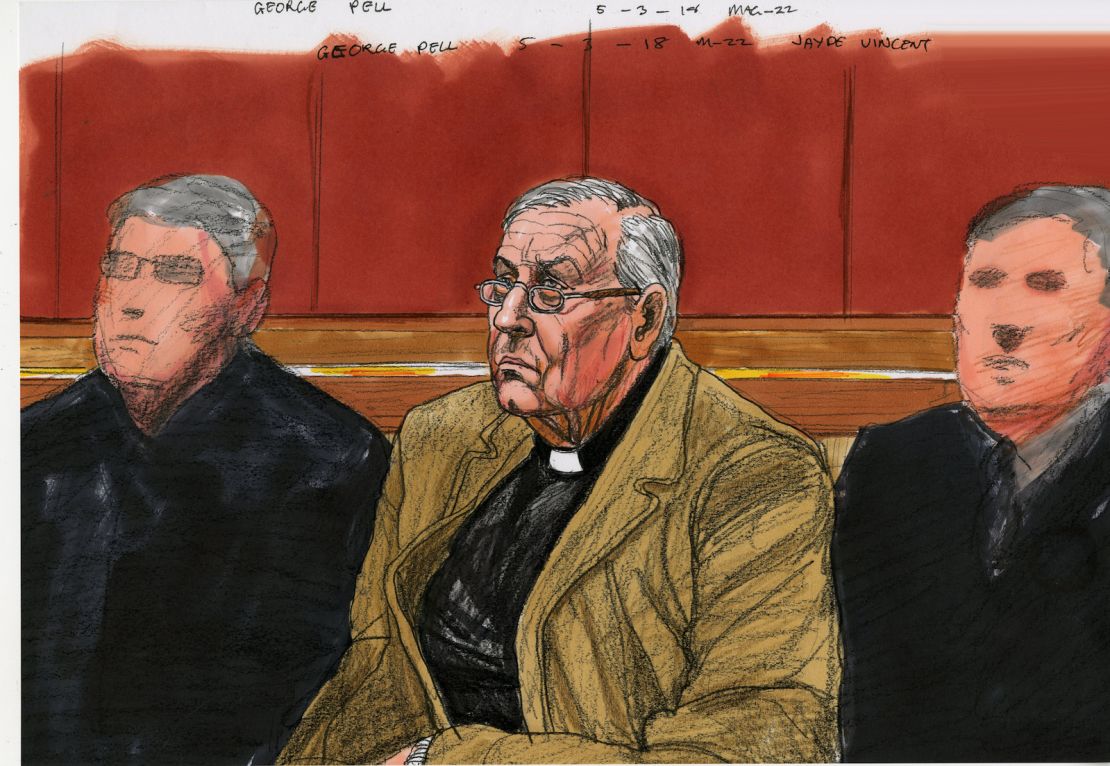Fiery accusations by the defense against witnesses and even the magistrate dominated the last days of a month-long committal hearing into allegations of abuse against Cardinal George Pell, the treasurer for the Vatican.
Pell has attended Melbourne Magistrates Court every day of the hearing, which concluded Thursday after listening to testimony from 50 witnesses, including a number of Pell’s accusers.
The cardinal, Australia’s highest-ranking Catholic official, is alleged to have committed abuse in the 1970s, in locations including a swimming pool, a cinema, a chapel and on a hill top in country Victoria. Pell has vehemently denied the allegations.
An additional allegation of abuse emerged during the committal hearing, of an incident at a sacristy at St Patrick’s Cathedral in Melbourne. Between 1996 and 2001 he was the Archbishop for the city.
A final decision on whether the case will proceed to trial will be made by the magistrate at an undisclosed future date. There is still a further hearing to take place on April 17 for the defense and prosecution teams to make their verbal submissions to the court.
When he was initially charged in June last year, Pell said he hoped to clear his name in Australia and return to his post in Rome, where he is a trusted senior figure in the Holy See, alongside Pope Francis.
Defense lawyer attacks magistrate
Pell’s defense lawyer Robert Richter made headlines throughout the course of the committal hearing for his fierce and confrontational defense, at one point calling for the magistrate overseeing the case, Belinda Wallington, to be disqualified.
Richter, 72, considered one of Australia’s leading criminal barristers, condemned the police investigation and also accused a journalist who wrote a book on Pell of “poisoning the public’s mind.”
On Wednesday, during a discussion about precise dates Pell is alleged to have abused someone at a cinema, Richter criticized the magistrate for not accepting a date he’d suggested as fact.
Famous for his temper and forensic questioning, Richter then proceeded to make an extraordinary formal application to Wallington herself that she should be stood down from the case.
“I apply for your honor to be disqualified from further proceedings in this matter on the basis of (a) biased view of the evidence,” he told the court.
Wallington immediately responded, saying: “Your application is refused.” Richter did not appeal the decision or make further submissions.
Police investigation questioned
It was revealed for the first time this week, during cross-examination of Paul Sheridan, head of serious crime division, Crime Command, Victoria Police, that detectives had secretly planned to arrest and question Pell when he was supposed to attend a Royal Commission hearing in Melbourne in November 2015.
The Royal Commission into Institutional Responses to Child Sexual Abuse held hearings across Australia for years, including in Pell’s home town of Ballarat for several weeks in May 2015, where there were multiple cases of clergy abuse.
Ten days before Cardinal Pell was due to travel to Australia, to give his testimony, he announced he was too unwell to fly. Cardinal Pell eventually gave video link evidence from Rome in March 2016.
Among his criticisms of the police investigation during the committal hearing, Richter told the court it would have been “illegal” to arrest Pell just to question him.
He also broadly criticized the detective work of the special Victoria Police operation to investigate Pell, “Operation Tethering.” Sheridan confirmed it was created in 2013 to purposely gather information on the Cardinal.
The defense attorney alleged there was no supporting evidence or witnesses to back up the claims of abuse by the accusers, many of whom he claimed had been treated in psychiatric wards in the past and had allegedly also been abused by other clergy.

Richter claimed the police operation “lay dormant” for nearly two years without a single accuser until the squad suddenly deepened its inquiries because of “public and political pressure.”
He suggested the pressure was due to the Royal Commission hearings taking place at the time.
Richter also hit out at the detectives who investigated allegations against Pell, claiming proper procedure was not followed when interviewing potential witnesses.
He said even though detectives got search warrants to raid several addresses in Melbourne in 2016 they failed to search the archives at St Patrick’s Cathedral for Pell’s diaries that would have pin-pointed his movements and possibly helped vindicate him.
Cardinal to return for final decision
Pell is expected to spend the holy weekend in a seminary in New South Wales to await the decision of the court.
In the meantime huge crowds are expected at Saint Peter’s Square at the Vatican where Pope Francis will lead mass Sunday and give the Easter message.
In an exclusive report in January, CNN revealed Pell has been staying in the Seminary of the Good Shepherd in Homebush, Sydney, with 40 trainee priests while he fights the case.
As the cardinal left the court Thursday he declined to answer questions from CNN about how he felt at the end of the committal case.
He has been excused from attending a submissions hearing on April 17 but will return for the final decision at a date yet to be announced.






